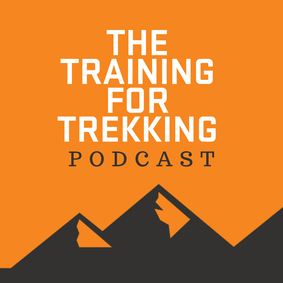|
In this episode I explore a simple strategy which can save you A LOT of mental energy if you are going through a big training journey.
EPISODE TRANSCRIPT: [0:00] All right. Hello, hello, ladies and gentlemen. So in today's episode, we are covering episode number 16 of our 20-episode miniseries, which is 20 Lessons Learned Through 20 Weeks of Training. And in today's episode, we're talking a little bit of an interesting subject, a little bit of a funny subject, and it may not apply to a huge amount of people. But for me, when I was going through my own training process, it was really, really, really valuable. And I know there's been a lot of clients over the years that I have talked about this with. So it may not be hitting most people listening, but I think it'll be really, really valuable for quite a few people listening. [0:37] So essentially, when you are going through a bit of a big training process, when you've got a big goal in mind, you're putting a lot of time and attention into this thing, when you're doing a lot of habits to really, really make sure you're leading towards whatever you want, and you're really, really, really putting focus towards a a particular outcome, you're going to notice that a lot of people out there are going to be asking about your journey. Friends, family members, co-workers, this and that, which is all well and good, but it can often get really, really, really exhausting just purely from the fact that people asking about it all the time. So today I'm going to be talking you through a little bit of a simple simple strategy to kind of help you. [1:20] Now, to tell you the story where this came from for me, during my training process, a lot of people were really curious about my training. As I sort of said, friends, family members, this and that, and why I was doing certain things. They were curious about that. You know, friends and family were curious why I was doing something so rough of all things. They thought it was a bit odd why I was choosing martial arts, why I wanted to actually have an event, have a fight, and they were curious about that. People were constantly asking me why I I was so tired because I was up so early in the morning. I was training so hard. I was regularly, you know, at 7.30 at night getting yawning or tired-faced. [1:55] People would be questioning me if I had a bit of a limp or bruises or whatever, which was a relatively common occurrence through that type of rough training, or when I wasn't drinking or a dozen other things. And most of the times when people were asking about this, it was coming from people who were genuinely curious, which is fair enough. People are interested in what's going on in other people's lives. They're asking questions just out of curiosity. But when you get asked these questions again and again and again and again, week after week after week, it can get really, really exhausting mentally. It can get really, really, really burdensome. And it ends up being a little bit tough. And you end up kind of almost dreading these conversations. And you're like, oh my gosh, I don't even want to talk to friends or talk to family members because I know what's going to come up. And that's obviously not great. [2:41] So as a simple solution to this, to make these situations so much easier for me mentally, so I wouldn't have to expend extra mental energy here, I wouldn't have to worry about it, and I literally could just be confident that, you know, I could steer the conversation in whatever, you know, route I wanted, I came up with some prepared answers for these common questions, which I knew were coming up all the time, and which I knew I could just use very often. And because they were prepared, I didn't have to think, I didn't have to um and ah, I didn't have have to kind of explain things, but they were prepared, they were short, they were concise, they got to the point, got what I wanted across, and they didn't take a huge amount of mental effort. So for example, if people ask me why I was doing this particular type of training, I was just saying, look, I just want to do something different because I've been bored with my training and this is different and it's going to get me excited about it again. [3:31] Simple, explains things, straight enough, and I'd say that and people are like, okay, cool, that makes sense. And then either I could just ask them a question and steer the conversation conversation away from what I knew was going to be a follow-up, or they would ask something else, but that will kind of cover things. In what, 10, 20, 15 words or whatever, that got across what I needed to get across, as opposed before when I had to um and ah and make things up and this and that, and it ends up being a bit draining. And I'd end up saying that four or five times in a night if I was going around at a big social occasion like a wedding or something. So there you go. Or if someone asked me why I was doing something so rough, and it was pretty much the the same answer, just saying, I've never done anything like this before. So it was different and it was interesting to me. Or why I was so tired. I was like, look, I'm just up at 4am every day for training. So I've been up for a while now. You can say that short, that concise, that makes sense. Instead of me saying, oh my gosh, I've had so much going on. I've been training, I've been eating, I've been doing this and yada, yada. That's it. Or why I had bruises. I'll just say, I've been wrestling in the gym. [4:30] Four words gets the point across. Or if I'm not drinking, if I have one, I'll probably end up having a few more and I don't really want a few more. And for each situation that sort of came up pretty regularly, I came up with answers and it really, really helped just purely from that mental load and purely because I was already tired through this training process and purely because it was taking over my life, this time of training. In the social situations, I didn't want to spend the whole time talking about me, me talking about the training. I wanted to sort of, you know, be distracted. I want to talk about other things, but they kept on coming up. So these prepared answers were really, really, really simple. [5:06] Now for you, you can literally do the same thing. If this kind of feels like it's resonating for you a little bit and you're like, you know what, in all honesty, yeah, it does get a bit exhausting sometimes. It is a bit of a struggle sometimes, whether it's for a big event, particularly for people who are going through a pain journey. This is one I didn't mention earlier, but if you're going through a pain journey, you're going through rehab, you're going through a bit of an extended thing, [5:26] whatever it may be, you'll get these questions all the time and it can really get you down. So this is a great strategy for this type of thing. You know, if someone asks you, why are you doing this hike? Have an answer. Why this particular hike? Have an answer. Why are you spending all this effort training when, you know, the subtext, if it's just a walk, have an answer. Say, look, I'm doing this because it's a great reason to train and get healthy. Or I'm doing this because I don't want to get out there and really struggle. I just want to enjoy myself of, or whatever it may be. Someone may ask you, why are you going to this country as opposed to just hiking locally? You may say, look, I've always dreamt of this, or maybe I want to experience the culture, or whatever it may be. If you've got pain, like someone's asking you, okay, why are you wearing a knee brace? Have a quick answer. Or why are you on crutches? Or why are you doing this? Or why are you doing that? For all of these recurring questions that are coming up, just spend a few minutes, come up with a prepared answer, and just have it ready to go. It makes such a difference. So for all of this stuff, again, if this is resonating for you, what I I would recommend is just sit down, write out all the questions that you get on a regular basis. All the ones you're like, oh my gosh, you know, I hear this like all the time and it does get a bit exhausting and just come up with some short and concise answers for it. [6:35] Now, this may seem a bit funny and I know a lot of people listen to this and be like, oh my gosh, why even bother? Like, it's not a big deal. You're just talking to your friends, just talking to your family members or whatever. And if you're thinking that, fine, you don't need this strategy. But I know in the the past, there's been quite a few hikers that have been in a situation like this, and this has helped. And I thought it was worthwhile talking about because it definitely helped me through my process. And I always know if there's something that's helped me, there's going to be other people in a similar situation. So if you do find yourself getting a little bit mentally exhausted from those recurring questions, give this a go, get those recurring answers, and I guarantee it'll make a bit of a difference. So with that being said, thank you so much for listening. I hope you've enjoyed today's episode and we'll talk to you very, very soon. Bye.
|
AuthorRowan is a personal trainer who specialises in training for hiking, trekkers and mountaineers for their bucket list adventures. Archives
March 2024
Categories
All
|
AboutSummit Strength is a personal training for hiking service created specifically to help hikers have the best chance of a safe, enjoyable and successful adventure.
|
Company |
Services |
|
|
© COPYRIGHT 2018. ALL RIGHTS RESERVED.
|
Website Design by My Personal Trainer Website
|


 RSS Feed
RSS Feed
